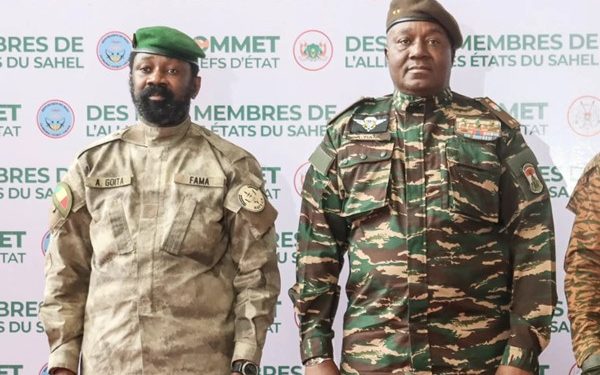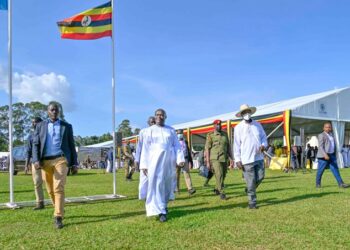Burkina Faso, Mali, and Niger ignore calls to remain as they seek to exit the West African bloc.
By Nosmot Gbadamosi
Burkina Faso, Mali, and Niger announced on Saturday that they have formalized their Alliance of Sahel States—just one day before the Economic Community of West African States (ECOWAS) regional bloc held a summit in Nigeria’s capital, Abuja, to discuss ways to bring them back into the fold.
The three junta-led Sahel nations signed a defense treaty cementing a new confederation, which was originally announced late last year. Military leaders from the three nations said they had agreed to create a joint investment bank and stabilization fund, and to pool their resources for projects in key sectors such as mining, energy, and agriculture. They also agreed to build a common infrastructure that would facilitate the free movement of citizens between the three countries—essentially agreeing to forge their own ECOWAS. Citizens of ECOWAS are free to live and work in member nations and can travel visa-free—much like the European Union.
After quitting the bloc in January, the three nations have now ruled out returning to ECOWAS, which they see as biased toward Western interests, including in its continued use of the French-backed CFA franc instead of prioritizing the launch of a common West African currency.
“Our people have irrevocably turned their backs on ECOWAS,” said Niger’s head of state, Gen. Abdourahmane Tchiani, at the Sahel group meeting in Niger’s capital, Niamey.
In February, Tchiani had suggested the three Sahel states would set up their own currency, which he argued was “a first step toward breaking free from the legacy of colonization.”
At the Saturday meeting, Burkina Faso’s leader, Capt. Ibrahim Traoré, accused ECOWAS of cowering to Western interests. “This continent has suffered and continues to suffer from the fire of the imperialists,” said Traoré. “Westerners consider that we belong to them and our wealth also belongs to them. They think that they are the ones who must continue to tell us what is good for our states. This era is gone forever; our resources will remain for us and our populations,” he added.
The head of the ECOWAS Commission, Omar Alieu Touray, warned that the withdrawal of the three nations risked the bloc’s future. “Our region is facing the risk of disintegration,” he said.
Africa’s youngest democratically elected leader, Senegalese President Bassirou Diomaye Faye, was selected at the ECOWAS summit to be an envoy to engage the three breakaway nations in reconciliation. Since his election in March, Faye has been vocal about prioritizing African integration. He shares many of the military leaders’ concerns and has insisted that any new partnerships with former colonial power France be mutually beneficial.
Legally, Niger, Mali and Burkina Faso will remain ECOWAS members for one year.
“I hope that by the end of the [one-year] notice period, we will have had enough conversations to reconcile views and strengthen the organization so that it can better tackle our shared challenges,” Faye said on Monday.
In Niger, the U.S. military announced on Sunday that it had completed the withdrawal of its troops from Niamey and will fully depart from its base in Agadez by August, ahead of a Sept. 15 deadline set by the country’s military leaders. The U.S. military had spent more than $100 million to build an airbase in Agadez, located to the northeast of Niamey, in 2013 to fight jihadi threats. Since its July 2023 coup, Niger’s junta had been hostile toward most Western nations—except the United States. But in April, failed talks with U.S. diplomats led to an unceremonious rejection of U.S. troops. The German military is also due to exit in a month.
All three juntas have scrapped military treaties and have asked Western troops to leave, instead signing defense deals with Moscow.
A decision by Nigerian lawmakers to put the country’s own security challenges first rather than lead a military force into Niger to restore democracy further signaled to belligerent nations that the bloc lacked strength. Abuja has the largest army within the bloc but has been weakened by various internal threats, which in turn have diminished ECOWAS’s ability to extend a show of force in troubled member states.
Yet the three nations will face some difficulties by choosing to exit a $702 billion trade market. “These countries are already landlocked, already facing quite a bit of transaction costs in terms of their trade with the rest of the world,” Abebe Selassie, the International Monetary Fund’s Africa department director said during a media briefing back in February.
Regardless, it will be a tougher ask for Faye to bring the three nations back, given that the pressure to return to democratic rule would still remain. It has not helped that those negotiating with the Sahel nations, such as Togolese President Faure Gnassingbé, have been allowed by ECOWAS to carry out what their opponents view as their own constitutional coups.
Gnassingbé changed the constitution, potentially allowing himself to remain in office for life and carry on his family’s 57-year-rule—making him a problematic choice to carry out negotiations, given that many Sahel citizens have supported recent coups against leaders who had refused to be accountable to their people.
As Jessica Moody wrote in Foreign Policy, “the failure of ECOWAS to do much to prevent constitutional coups and flagrant violations of democratic norms sent a message reverberating across the region that democracy was there to be challenged.”
The three nations may look to broker sea access through Togo, directly negotiating with a fellow undemocratic leader who openly sidesteps ECOWAS’s democratic ethos and thereby circumventing higher transaction costs on exports.







Discussion about this post